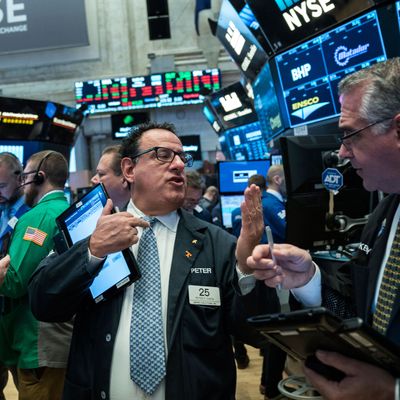
The early economic news today sure looked good for the country, not to mention for the eager credit-taker in the White House, who is promoting the idea that the recovery that began in his predecessor’s tenure is all his doing. The January jobs report showed steady gains, with 200,000 net new jobs. More importantly, the report’s wage data were very promising, as the New York Times explains:
Average hourly earnings jumped 2.9 percent in January from a year earlier, the Labor Department said Friday, the latest sign that the long, slow economic recovery is at last reaching Americans’ pocketbooks.
This news reinforced the even more impressive growth indicator that came out yesterday:
The U.S. economy is on track to grow at a 5.4 percent annualized rate in the first quarter following the latest data on manufacturing and construction spending, the Atlanta Federal Reserve’s GDPNow forecast model showed on Thursday.
That was an upward revision of an earlier 4.2 percent first-quarter growth estimate from the Atlanta Fed — itself an excellent number.
Now, this is just an estimate of what annual growth would be if this quarter’s trends continue. But it’s a lot higher than the 2.6 percent rate at which the economy grew in 2017, and for the first time gives some credence to the president’s promise that he’d have the economy roaring forward at a 4 percent rate pretty quickly.
Indeed, you don’t have to wade into any political science treatises correlating election results to economic indicators to understand that a true economic boom with rising wages would be just what the doctor ordered for Trump and his party in a midterm election year.
But before there was even time for Team Trump to go into a self-congratulatory mode (not that anyone would have much noticed on a day when the Nunes memo was soaking up all the oxygen in Washington), the good economic stats reinforced a stock market undertow, as the Dow Jones Index slid (as of this writing) more than 600 points, or well over 2 percent of the market’s value. This continued a weeklong sell-off that was the most acute since 2016, and that was mostly being attributed to investor fears of higher interest rates. And signs of rapid growth, and particularly of wage gains, are only making such fears more acute, as CNBC notes:
“The reaction in the bond market is due to the rise in average hourly earnings,” said James Ragan, director of individual investor group research at D.A. Davidson. “I think the market is now thinking of the possibility that the Fed could raise rates four times this year rather than three.”
Higher bond yields mean lower stock prices — thus the sell-off. Said investment manager Mike Baele today: “The old adage is: ‘Bull markets don’t die of old age, they are killed by higher interest rates.’ That looms large.”
For Team Trump, the message is plain: Good economic news can breed bad economic news very fast. And what so many of them want to claim as a Trump boom could turn into a Trump bust before long if interest rates — not exactly within the administration’s control — go up quickly to counter inflation fears.
The president loves hyperbole, and wants us to think his tax and regulatory policies are unleashing productive furies that will drive stock market prices ever upward. He’d be smarter to hope for slower and steadier growth. In November of 2018 and in November of 2020, nobody’s going to care if the economy showed a temporary spike that turned out to be illusory or that the Fed soon crushed.






























